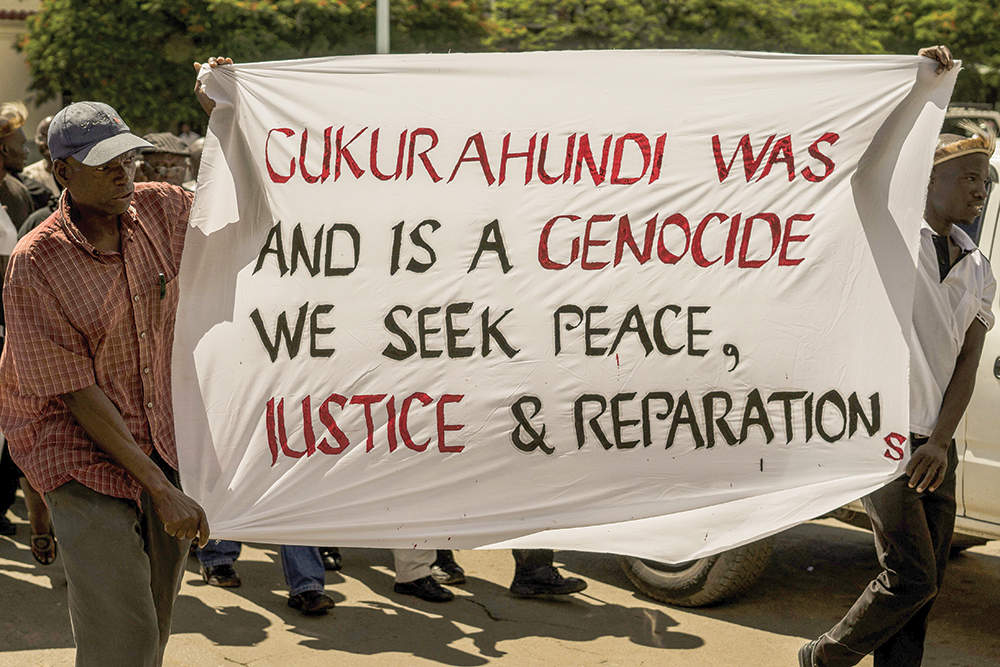In Matabeleland, the Gukurahundi massacres of the 1980s still cast a long shadow. Though public reconciliation hearings were launched in July 2024, many survivors feel out of place, especially those who escaped to urban areas.
For MaSiziba*, a resident of Jahunda township in Gwanda, every step she takes reminds her of the trauma. Her limp — the result of a brutal beating during the 1980s killings — carries the weight of the violence that tore through her family and community.
“It was in 1983, at Ntunungwe village under Bulilima, when I witnessed the killing of my father,” she narrates. “We were gathered under a big tree and told we did not deserve to live.”
“Women who couldn’t complete missions were beaten; I was one of them. My mother helped me flee to Gwanda (town) for safety, but even that journey was full of terror.”
Masiziba*
On her way to the safety of town, soldiers repeatedly stopped the bus she boarded. Some passengers were beaten; others were killed. One woman, she recalls, was forced to eat a live chameleon found in her bag.
“We watched her die,” she says, her voice breaking. “I will never forget that.”
When President Emmerson Mnangagwa launched the Gukurahundi public hearings in July 2024, survivors like MaSiziba hoped it would bring long-awaited closure. But as hearings proceed mainly in rural areas, she feels left behind.
“Why are these hearings not happening in towns?” she asks. “Many of us ran to the cities for safety. We are victims too. We deserve to be heard.”
Local faith leader and peace advocate Reverend Sipho Mhizha shares MaSizaba’s frustration.
“Our community is full of survivors carrying pain in silence,” he says. “Reconciliation must reach everyone, not only rural wards.”
Mhizha believes reconciliation should start with an official acknowledgment of wrongdoing and an apology from the Harare administration. His counseling and peace sessions in Gwanda have become safe spaces for survivors to speak for the first time in decades.
“People have been living in fear for years,” he says. “But now, slowly, they are beginning to talk. Healing starts when the truth is spoken.”
Another survivor, Ntokozo Ndlovu*, says the process feels rushed and shallow.
“We deserve to know why it happened. We want platforms to express our pain, not just compensation. Healing needs truth.”
Ntokozo Ndlovu*
Between 1982 and 1987, an estimated 20,000 civilians, mostly Zapu supporters, were killed by the Fifth Brigade, a government-affiliated elite unit, leaving mass graves, shattered families, and deep mistrust between the state and Matabeleland communities.
According to The Herald, a government-affiliated publication, as of September 30, 2025, chiefs leading the process had documented 13,695 survivor submissions across Matabeleland North and South — reflecting both growing engagement and the enormity of the pain still being catalogued.
Human rights groups, however, warn that without guarantees of justice or follow-up action, the process risks being symbolic.
“True reconciliation requires honesty,” Mhizha says. “If the government is serious, it must confront the past, not just manage it.”
For survivors like MaSiziba, sharing her story publicly after decades of silence is itself an act of courage.
“We have lived in fear that our past would catch up with us,” she says. “Now I feel ready to speak, even if it still hurts.”
Editor’s note: Names marked with an asterisk have been changed to protect survivors.

